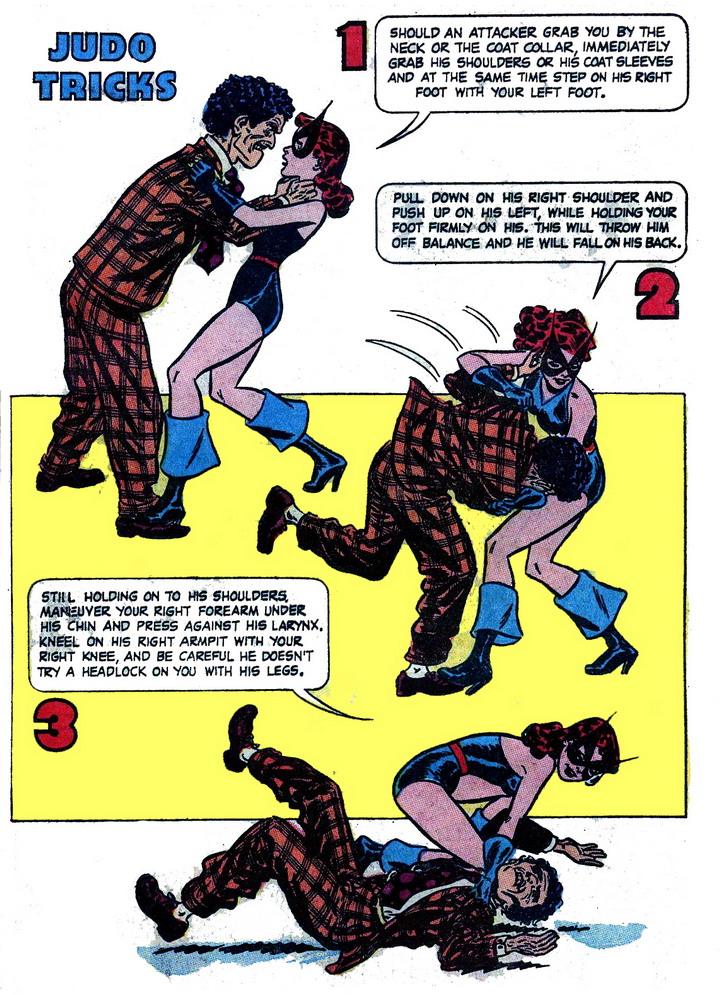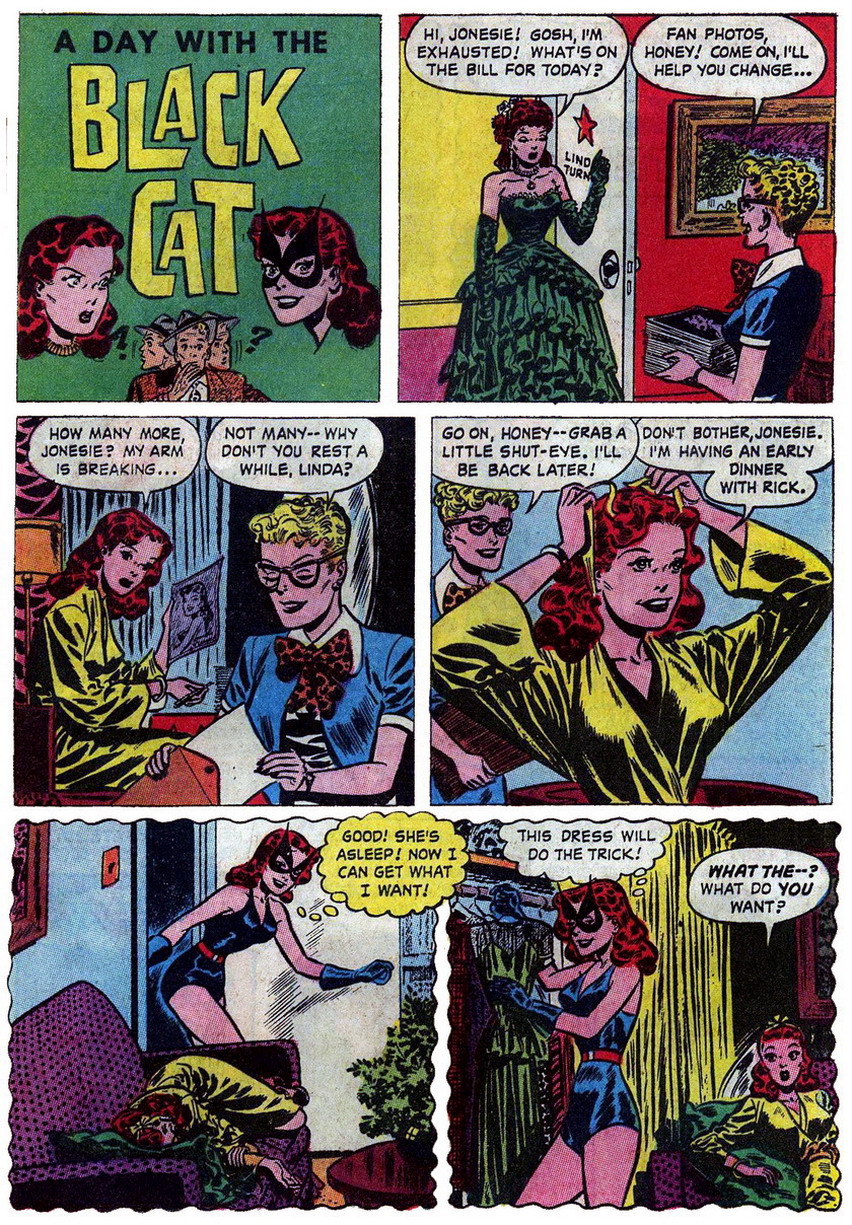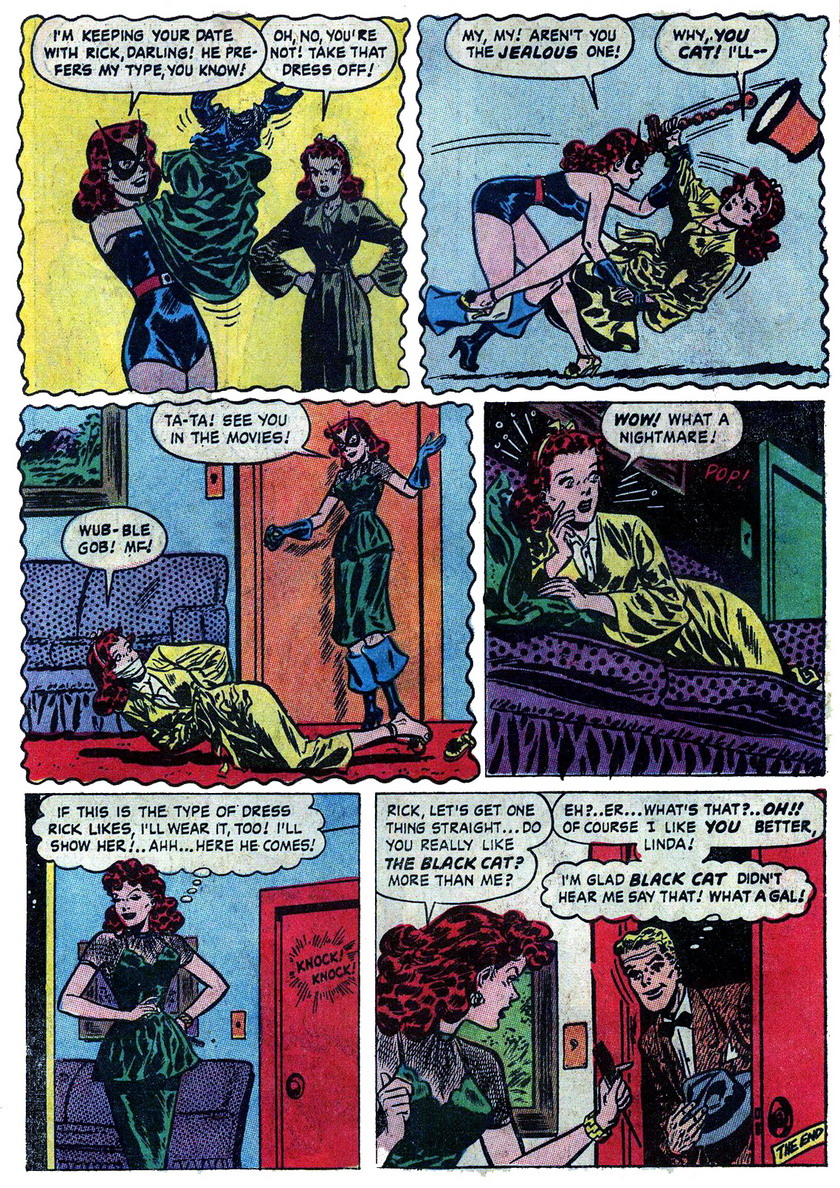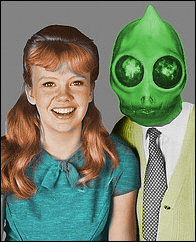 The Black Cat is a Golden Age comic book heroine that was targeted, perhaps unfairly, by watchdog groups for excessive violence and as being unsuitable for children. While I agree the latter issues of Black Cat were a product of an out of control industry desperate for market share and were not suitable for young readers, the earlier pre-Comics Code issues of Black Cat were pretty mild, standard superhero detective fare. Not that it was easy to keep up as the book went through several format changes in order to attract readers. Compared to the infamous Radium Cigarette issue there really wasn't much in the earlier issues worth gathering the pitchforks and torches over.
The Black Cat is a Golden Age comic book heroine that was targeted, perhaps unfairly, by watchdog groups for excessive violence and as being unsuitable for children. While I agree the latter issues of Black Cat were a product of an out of control industry desperate for market share and were not suitable for young readers, the earlier pre-Comics Code issues of Black Cat were pretty mild, standard superhero detective fare. Not that it was easy to keep up as the book went through several format changes in order to attract readers. Compared to the infamous Radium Cigarette issue there really wasn't much in the earlier issues worth gathering the pitchforks and torches over.
What made some people concerned were not frank depictions of adult relationships and extreme violence but the occasional back-up feature depicting the Black Cat showing readers how to practice martial arts moves. All the martial arts features were purely defensive in nature but groups complained that children could use the information in the title inappropriately and possibly hurt themselves, others or if the illustrations are any judge, the occasional wandering Italian. Most of the time the wink-and-nudge was ignored or missed in the Golden Age. This shows parent groups and other advocates did not read, or if they did read the content, did not understand the medium and they focused only on the obvious.
Black Cat #11 (May 1948) is noteworthy for another reason other than the self-defense courses for women and it has all to do with the often over-looked subtext.
Sexy fetishes aside the two-page back up tale A Day With the Black Cat is an early depiction featuring a clear and disturbing schism between the civilian and superhero identities. I would be hard-pressed to find an earlier example so dramatic. This is a theme that would later become the foundation for superheroes for several decades as characterization and continuity would be introduced by creative teams expanding the genre. The Hulk, Doctor Fate and Batman are just a few examples of characters that expressed extreme differences in their personalities, in some cases completely different psyches that displayed they were not fully in control.
In the two-page story Linda Turner is a famous, wealthy and gorgeous (though probably repressed) actress. After a hard day at work she falls asleep in her dressing room only to be awakened by her other self, the sexy, sexy Black Cat. As the Black Cat explains, now that Linda is asleep she can behave in ways that Linda never would or could. In the dream, Linda wakes up as her other personality begins to rifle through a closet for sexy, sexy clothes to wear on a date with her long-time and probably equally repressed boyfriend. One could easily claim that every single item in the dream setting is full of meaning, from the closet to the items within it to the room itself. It is clear that Linda is at war with herself. A fight ensues with both sides of Linda's personality struggling for supremacy in her dressing room, a place which obviously represents Linda's mind. Inevitably the sexy, sexy exhibitionist in fetish gear wins the fight and Linda Turner is bound, gagged and left on the floor. The triumphant Black Cat departs via the door, obviously in this scene taking control of the body and leaving the Linda personality, which was first seen in this feature wearing head-to-toe Elizabethan clothing, to be suppressed and forgotten in favor of a woman wears fishnet and leather.
A fight ensues with both sides of Linda's personality struggling for supremacy in her dressing room, a place which obviously represents Linda's mind. Inevitably the sexy, sexy exhibitionist in fetish gear wins the fight and Linda Turner is bound, gagged and left on the floor. The triumphant Black Cat departs via the door, obviously in this scene taking control of the body and leaving the Linda personality, which was first seen in this feature wearing head-to-toe Elizabethan clothing, to be suppressed and forgotten in favor of a woman wears fishnet and leather. When the Black Cat awakes she dons the same sexy, sexy dress she previously picked out in the mental "closet" and proceeds to replace Linda in her life. I think the boyfriend is in for a surprise or two.
When the Black Cat awakes she dons the same sexy, sexy dress she previously picked out in the mental "closet" and proceeds to replace Linda in her life. I think the boyfriend is in for a surprise or two.
Wow. To think Congress got all upset about the Judo.
Wednesday, August 27, 2008
Sexy, Sexy Fight Club
Posted by
Sleestak
at
8/27/2008 06:00:00 AM
![]()
![]()
Labels: black cat, fetish, secret identities, Seduction of the Innocent
Subscribe to:
Post Comments (Atom)



























Great article, Sleestak. Black Cat's secret identity issues are VERY interesting. Is it just me, or does there seem to be a requirement in super-hero comics that any character called "Black Cat" has to have a psychological issue that, in any other medium, would require them to be in therapy? Spider-Man's "Black Cat" comes to mind.
ReplyDeleteParents groups RARELY see the actual content of a medium they are objecting to... television shows, games, comic books, Dungeons & Dragons, the list goes on and on. It's depressing, because while they may have SOME valid concerns, it's lost in the noise of their excessive shrieks and their obvious ignorance of the content.
ReplyDeleteAnd that split-personality storyline is pure awesome for any comic book fan. Encapsulates a lot of issues so completely...